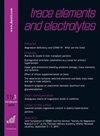Determination of serum trace elements (Se, Fe, Zn), macrominerals (Ca, Na, Cl), and physical activity levels in COVID-19 patients
IF 1
4区 生物学
Q4 BIOCHEMISTRY & MOLECULAR BIOLOGY
引用次数: 0
Abstract
Objective: This study mainly aims to determine serum trace elements, macrominerals, and physical activity levels in COVID-19 patients compared to healthy controls. Material(s) and Method(s): This prospective study was conducted among COVID-19 patients (group I, n = 20) and healthy controls (group II, n = 20). Serum trace element levels (Se, Fe, and Zn), macrominerals (Ca, Na, and Cl), vitamin D, ferritin, and physical activity levels were determined. Result(s): Of the participants in group I, 90% had Se deficiency, 65% had Fe deficiency, and 35% had Zn deficiency. In addition, 45% of the participants in group II had Se deficiency. There was Ca deficiency (60%), Na deficiency (40%), and Cl deficiency (30%) in COVID-19 patients. Healthy controls did not have any macromineral deficiencies. The trace element levels including Se, Fe, and Zn were not statistically significant (p > 0.05);however, the micromineral levels including Ca, Na, and Cl were significantly lower between groups (p < 0.05). There were vitamin D deficiencies in 90% and 70% of the participants in group I and group II, respectively. Ferritin levels were significantly higher in group I than group II (p < 0.05). All the participants had low physical activity levels in group I, and 40% of the participants had low physical activity levels in group II. Conclusion(s): This study showed that COVID-19 patients might have lower Ca, Na, and Cl levels than healthy adults. In addition, high rates of Se, Fe, Ca and vitamin D deficiencies, and ferritin levels may be seen in COVID-19 patients. Moreover, COVID-19 patients may have low levels of physical activity. Copyright ©2022 Dustri-Verlag Dr. K. Feistle.COVID-19患者血清微量元素(Se、Fe、Zn)、大量矿物质(Ca、Na、Cl)和体力活动水平的测定
目的:本研究主要旨在测定新冠肺炎患者与健康对照者血清微量元素、常量矿物质和体力活动水平。材料和方法:这项前瞻性研究在新冠肺炎患者(I组,n=20)和健康对照组(II组,n=20)中进行。测定血清微量元素水平(Se、Fe和Zn)、常量矿物质(Ca、Na和Cl)、维生素D、铁蛋白和体力活动水平。结果:在第一组的参与者中,90%的人有硒缺乏症,65%的人有铁缺乏症,35%的人有锌缺乏症。此外,第二组45%的参与者有硒缺乏症。新冠肺炎患者存在Ca缺乏(60%)、Na缺乏(40%)和Cl缺乏(30%)。健康对照组没有任何宏矿物质缺乏。硒、铁、锌等微量元素含量无统计学意义(p>0.05);然而,包括Ca、Na和Cl在内的微量元素水平在各组之间显著降低(p<0.05)。第一组和第二组中,维生素D缺乏的参与者分别为90%和70%。第一组的铁蛋白水平显著高于第二组(p<0.05)。第一组所有参与者的体力活动水平均较低,第二组40%的参与者体力活动水平较低。结论:本研究表明,新冠肺炎患者的Ca、Na和Cl水平可能低于健康成年人。此外,新冠肺炎患者中硒、铁、钙和维生素D缺乏率较高,铁蛋白水平也较高。此外,新冠肺炎患者的体力活动水平可能较低。版权所有©2022 Dustri Verlag K.Feistle博士。
本文章由计算机程序翻译,如有差异,请以英文原文为准。
求助全文
约1分钟内获得全文
求助全文
来源期刊

Trace Elements and Electrolytes
生物-内分泌学与代谢
自引率
0.00%
发文量
17
审稿时长
>12 weeks
期刊介绍:
Trace elements and Electrolytes appears quarterly and publishes reviews and editorials, original papers, short communications, and reports on recent advances in the entire field of trace elements. Papers on experimental findings are accepted if they bear a close relationship to human diseases. Correspondence (letters to the editors) and current information including book announcements will also be published.
 求助内容:
求助内容: 应助结果提醒方式:
应助结果提醒方式:


